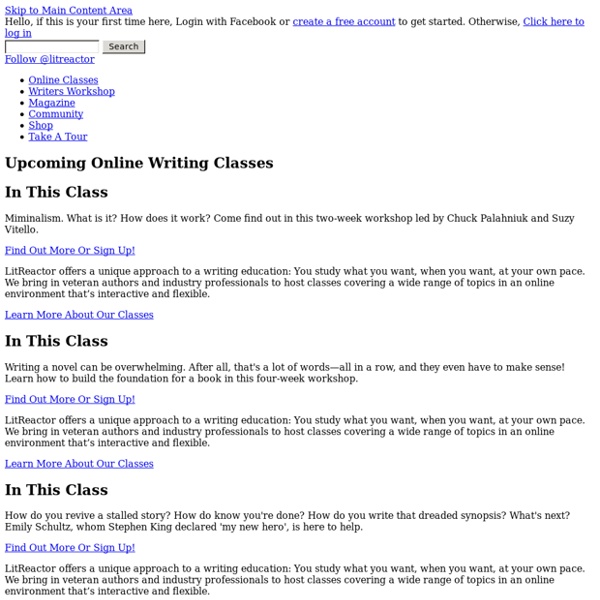



50 of the Best Websites for Writers There are tons of reference sites on the web that can help you find a job or write a poem, essay or story. Here is a list of the best 50 websites for writers. Reference Websites Merriam-Webster Online - Merriam Webster is the perfect place to look up words and find information. The site offers a dictionary, thesaurus, encyclopedia, podcasts, word games and a lot of other things that may be of interest to writers and word-lovers. Bartleby - This site is good if you need a quote or if you want free access to encyclopedias, dictionaries, thesauri, and other reference books.
General Fiction Getting Around... Career Essentials Getting Started Queries & Manuscripts Market Research Classes & Conferences Critiquing Crafting Your Work Grammar Guides Research/Interviewing Writing Contests The Writing Business Income & Expenses Selling Reprints Collaboration Pseudonyms Negotiating Contracts Setting Fees/Getting Paid Rights & Copyright Tech Tools The Writing Life The Writing Life Rejection/Writer's Block Health & Safety Time ManagementColumn: Ramblings on the Writing Life Fiction Writing - General General Techniques Characters & Viewpoint Dialogue Setting & DescriptionColumn: Crafting Fabulous Fiction Fiction Writing - Genres Children's Writing Mystery Writing Romance Writing SF, Fantasy & Horror Flash Fiction & More
Writing Writing Even the best writers sometime need a little stimulation, if only for practice. Otherwise, writers may face the dismal monstrosity of writer's block. These generators are here to help when you need plot ideas, genre-bending concepts, and more. Writers Association - What is Horror Fiction? That's a difficult question. In recent years the very term has become misleading. If you tell people you write horror fiction, the image that immediately pops into their minds is one of Freddy Krueger or maybe Michael Myers, while you were hoping for Shelley's Frankenstein or Stevenson's Dr. 400 Writing Topics - Prompts and Suggestions for Paragraphs, Essays, and Speeches - Essay Topics If getting started is the hardest part of the writing process, close behind it (and closely related to it) may be the challenge of finding a good topic to write about. Sometimes, of course, an instructor will solve that problem for you by assigning a topic. But at other times you'll have the opportunity to choose a topic on your own. And you really should think of it as an opportunity--a chance to write about something you care about and know well. So relax.
WRITER BEWARE ® About Us Mission Who we are, what we do, and why. Includes information on how to contact us. Overview and Site Map What you’ll find on the Writer Beware website, plus links to general resources about literary scams. Writer Beware® Legal Recourse and Other Remedies Argumentative Essay Topics - Topics For A Argumentation Essay Writing an essay on one of the argumentative essay topics requires to be well armed with strong and convincing arguments concerning one of the chosen topics for a argumentation essay. Your personal position and insight should of course be the basis of your work, but the main point is that your personal views have to be supported by founded arguments, reasons, proofs and evidences and proceed from the factual information. Hence, your work should bristle with clearly-cut and legible arguments to look like a real argumentative essay. The arguments are the facts or statements which will support your position. Be always ready for the opposition to your opinion.
The Writing Process These OWL resources will help you with the writing process: pre-writing (invention), developing research questions and outlines, composing thesis statements, and proofreading. While the writing process may be different for each person and for each particular assignment, the resources contained in this section follow the general work flow of pre-writing, organizing, and revising. For resources and examples on specific types of writing assignments, please go to our Common Writing Assignments area. Writing Task Resource List This resource will help you find OWL material for the many different kinds of writing tasks you may face in school and in the workplace. Starting the Writing Process How to Write Articles and Essays Quickly and Expertly Translations: Belorussian Introduction: Four Types of Discursive Writing From time to time people express amazement at how I can get so much done. I, of course, aware of the many hours I have idled away doing nothing, demur.
List of essay topics List of essay topics includes essays that helps you in learning English, especially writing and speaking: Note: There are approximately 1,000 essays in the list of essays; however there are many more essays especially recent published essays not in the list. You are recommended to use the google search box on the top of our site to fully search for the essay you want in the whole site of our own. With the google search box, you can find out the essay you are looking for easily and quickly. * Put the essay topic in the google search box to search for the essay. School:* Do you think that homework should be abolished?
Jack I am working on a post-apocalypic survival novel. Set after an EMP or Nuclear event, not sure which yet. by ianrawlings Mar 1
Great site. I just signed up for the newsletter. Is anyone paying the subscription to submit work and share critiques? Is it worth it? by pegfleming Feb 27
I write for a documentary / lifestyle podcast, I also write fiction. What do you write about? by jackrdavis Feb 27
thanks.what do you write about by ianrawlings Feb 27
A massive resource for aspiring writers. A true pearl. by jackrdavis Feb 24